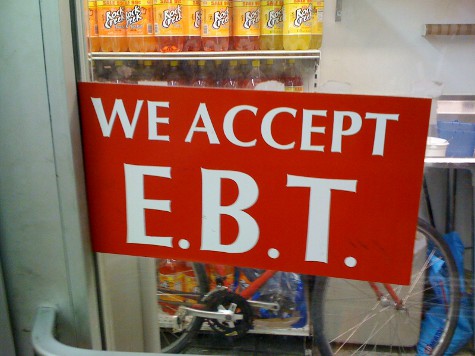Advocates for big government have attacked a proposal by House Republicans to cut SNAP (Supplemental Nutrition Assistance Program), which use to be known as food stamps. The proposed cuts would be $1.6 billion, or roughly 2 percent of the yearly cost.
Phony outrage erupted as Senator Kirsten Gillibrand (D-NY) invoked Scripture to defend her opposition to the spending cuts: “In Matthew 25, the first question Christ asks on Judgment Day is, ‘Did you feed the poor?'” The Senator’s mockery of the religious right is a calculated approach; Gillibrand did not bring up big business and greed as she so often has in the past, because this time it did not advance the statist narrative. The beneficiaries of food stamps are not the poor; they are Big Agriculture, Big Banks, and Big Business.
The basic movement of funds in the SNAP program start in Congress when billions of dollars are allocated in the Farm Bill, which is comprised of 78% funding for Food Stamps. The costs are split between the federal government and state governments. At every level of the process, big government and big business work hand in hand in the name of caring for the poor.
The Farm Bill is reapproved every five years; in the 2007 bill, the biggest lobbyists included the agriculture biotech giant Monsanto, which spent $8.8 million. Other large corporate lobbyists included American Farm Bureau, Kraft Foods, PepsiCo Inc., American Beverage Association, Tyson Foods, Coca-Cola Co, Wal-Mart Stores, and the GMA (Grocery Manufacturer Association).
Big Agriculture lobbies Congress knowing hundreds of millions of dollars are on the line for their corporations.
Lobbying also takes place at the state level, where Big Agriculture has been fighting off further regulation of SNAP. State laws cannot strictly mandate that certain purchases be forbidden with the use of SNAP; the USDA (United States Department of Agriculture) has jurisdiction on how SNAP money is spent. State laws are required to seek a waiver from the USDA on certain products. Nine states proposed bills to alter SNAP to make it a more health-conscious program, but none of the proposed measures passed due to the pushback by Big Agriculture.
States contract with large banks in order to administer SNAP benefits; such banks charge fees, mostly to the states, for the use of electronic benefit transfers (EBT). The largest of such banks is J.P. Morgan Chase, which has EBT contracts in 24 states and makes a fortune from the Food Stamp Industrial Complex. J.P. Morgan Chase signed two contracts to administer EBT for the states of New York and Florida totaling $209 million. So much for liberals’ supposed disgust for the 1%.
Large retailers are also cashing in on SNAP benefits. Stocking the shelves with food stamp-approved foods, Wal-Mart made about half a billion dollars in SNAP purchases in two years just from the state of Oklahoma. That is a significant returns for Wal-Mart’s lobbying effort in the 2007 Farm Bill, where Wal-Mart lobbied for five provisions, all having to do with food stamps.
This is not an uncommon story; big business colludes with big government in the name of the public’s interests while they are making themselves rich with regulation, bailouts, corporate welfare, and government contracts. Americans don’t bother to get riled up about it because they expect it, because human nature reduces itself to whatever conditions the culture allows.

COMMENTS
Please let us know if you're having issues with commenting.